The Centre for the Study of the Philosophy of Islamic Law at Al-Furqān Islamic Heritage Foundation, in co-operation with the International Moderation Forum, and the Islamic Educational, Scientific & Cultural Organisation (ISESCO), organised a two-day international symposium titled “Towards a Unified Islamic Perspective on Issues Related to Women and Population” from Tuesday 16th to Wednesday 17th September 2014, at the Regency Palace Hotel, Amman, with the participation of scholars, researchers, and thinkers, as well as experts and specialists in both women’s issues and population issues, from Arab and Muslim countries.
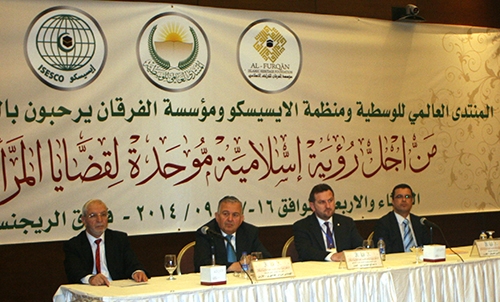
The symposium began on Tuesday morning with a speech by the Secretary-General of the International Moderation Forum, Eng. Marwan al-Faouri, which emphasised the symposium’s focus on elaborating an Islamic charter, defining how to tackle the customs and traditions that have denied women their rights in Islamic societies, and the need to formulate a moderate discourse that does justice to women, and grants them full political, cultural, and social rights. He continued by clarifying that the symposium’s philosophy was grounded on a framework of enlightenment and renewal, designed to confront the fanatics with their backward and extremist agenda. These fanatics justify the continuation of the appalling conditions suffered by Muslim women by misrepresenting religious texts—stretching their significance beyond their intent—to entrench disenfranchisement and subjugation in deploying the rule of “closing the means” (sadd al-dhara’iʿ); theirs is a male-centric jurisprudence (fiqh), in which the principles of legal theory (uṣūl) are suspended; similarly, it is directed against secular fanatics, who practise all forms of intellectual terrorism, and are hostile to the Muslim nation’s values, deal in stereotypes, and think that emancipation is achieved by divesting women of values and religion.
The ISESCO representative, Dr Izzuddin Ma’mish, stated that Islam holds the solution to the problems related to population and women, and thus, guaranteeing successful treatment. He expressed hope that the symposium would deliver practical alternatives that “enable the Muslim nation to grasp the initiative in safeguarding human dignity, and granting women their rights”. He also noted ISESCO’s participation with a key paper, explaining Islam’s perspective on the issues of population and development, as well as mapping the overlap between Islamic law (Sharīʿah) and international conventions. He continued by saying that the International Conference on Population and Development 2014 aimed to review international commitments and define a global map of human development, in accordance with the Cairo Conference (1994). He gave a briefing on the discussions on development, population, population growth, international migration, education, and health, as well as reproductive rights that are the theme of the forthcoming conference.
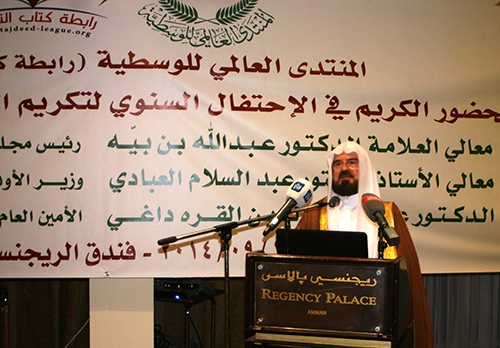
In turn, Dr Ali Qaradaghi, Deputy Secretary-General of the International Union of Muslim Scholars (IUMS), stated that society’s security and prosperity stems from proper attention to women, and through applying the Qurʾānic approach. He elucidated the position of family in Islam, in that the well-being and stability of the family forms part of society’s well-being and stability. He expressed IUMS’s willingness to co-operate in producing a clear illustration of Islam’s view on women and population.
For his part, Mr. Sali Shahsivari, Managing Director of Al-Furqān Islamic Heritage Foundation, said that this important symposium had been organised to provide proposals and solutions, elaborate a unified Islamic perspective, and formulate a working document on the issues of population and development, especially given these testing times, where the world is in dangerous crisis, and the Muslim nation faces many growing and escalating challenges. He added that of all the issues addressed by the symposium, the issue of women is central, especially as Islam had granted rights to, and honoured women, and assured equality with men; indeed, while nations share the ideal of honouring the human being generally, and women particularly, Islam set the precedent in its application. He concluded his speech by thanking all those who had contributed, whether in small or large measure, to paving the way for the symposium to be held.
Immediately after these speeches, the first day’s sessions began with a presentation by Dr Izzuddin Ma’mish, on behalf of ISESCO, describing the Organisation’s perspective on women’s rights and population. He explained that the essence of the document aimed to establish a framework of principles governing development, population, and women’s rights, derived from Islamic legislation, most prominently, freedom, development, equal opportunities, and equality.
On her part, the Parliamentary Secretary in the Moroccan Assembly, Dr Jamila al-Mosalli, called for a re-appraisal and framing in more precise terms of the concepts relating to women, such as equality. She requested revision of the concepts using scientific methodology, hinging on the importance of civil society. She concluded her speech by asserting the need for co-operation between all bodies, to correct the discourse on women and population.
Dr Aishah Fadli, President of the Right to Life Association, presented a working paper titled “A Reading into the United Nations Document on Motherhood and Childhood”. She declared that Muslims had made a mistake in allowing international organisations a free hand to write reports on population. In her words, we absented ourselves from participating in the preparation of such reports, despite their vital importance.
In his speech on “The Population Problem Between the Natural and Artificial Organisations”, Imam al-Sadiq al-Mahdi emphasised the need to consider population policy from the Islamic perspective as well as the new reality in the perspective on women. He called for the symposium recommendations to take account of circumstances, and not adopt a traditional style of discourse.Dr Nawal Sharar, Attorney in Islamic law, presented the importance of motherhood and childhood in Islam, explaining that Islam had integrated motherhood into religious practice.
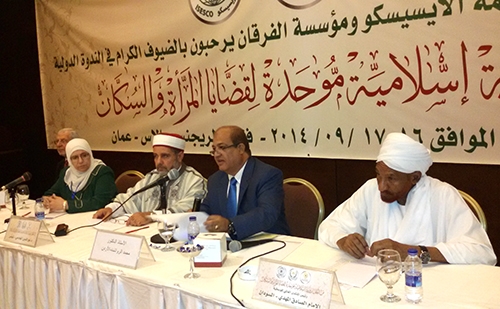
In turn, the former Tunisian Minister of Religious Affairs, Dr Noureddine al-Khadimi, emphasised the general principles ratified by Islam in the perspective on women, most prominently their humanity, dignity, rights, and duties. He pointed to the consideration of women’s biological and psychological specificities, evidencing this in texts from Qurʾān and the Prophet’s tradition (Sunnah), which confirm the general principles of Islam’s comprehensive perspective on women.
The second day’s sessions began with a study by Dr Muhammad al-Qudat titled “Women’s Participation in Public Life and Issues of Inheritance and Testimony”, in which he presented several important themes, and explained that women prior to Islam did not receive any consideration or rights, but suffered oppression, and that Islam as a religion had restored dignity and granted rights to women, most importantly the right to inherit.
As for Dr Atif ‘Idaybat, he spoke of “The Role of Intellectual and Cultural Bodies in Defending Cultural Specificities”, where he clarified the importance of organisations with all their branches in spreading awareness on the issue of women and their rights and duties, in order to prevent the oppression of woman and violation of their rights.
Dr Ahmad Abu al-Wafa led the session with a paper on “Respect for Cultural Differences Between Peoples”, where he explained the Islamic principles governing respect for cultural difference, such as: the principle of non-violation of higher Islamic rules; the principle of need to respect and take into consideration the specificities and customs of peoples; the principle of respect for cultural differences between states, nations, and peoples; the principle of right to freedom of belief; the principle of non-clash of civilisations but co-existence and parallelism; and the principle of non-interference in the affairs of others.
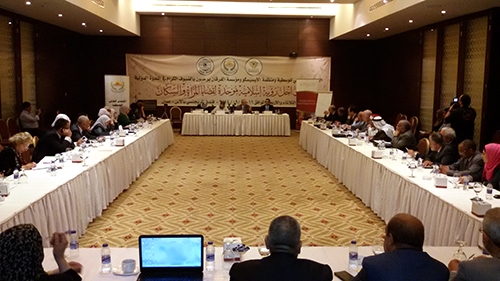
Dr Fat’hi al-‘Uyuni explained in his paper “Women Between International Rights and Domestic Laws” that post-independence, the political authority derived from the Tunisian Constituent Assembly had established a legislative framework that motivated all persons—men and women—without discrimination on the basis of gender. The state legislators had striven to provide special treatment for women, bringing them equal footing with men, at the level of education or employment. Indeed, several laws were issued aimed at achieving the greatest degree of equality with men in civil and personal rights. Subsequently, the legislative trajectory took an upward trend in terms of granting greater rights to women to include the political and civil society organisation contexts, reaching an apogee after the Revolution, through the legislation of the 50% principle and enshrining in the constitution those gains achieved by women over the past years. Therefore, Tunisian women today are able to proudly talk of their rights and achievements compared to other women whether in the Arab and Islamic world or the Western world, because these rights and gains respond to the majority of internationally-agreed rights, in the political, social, or family contexts.
Dr Khadijah Brayk presented a paper on “The Image of the Muslim Woman in World Cinema, and Its Reflection on the Position of the United Nations: A Critical Perspective”. She emphasised that the Arab and Muslim individual occupies prominent space in Western media as a negative, stereotypical personality—harmful, extreme, destructive, stupid, lazy, and other ugly descriptions. Therefore, work must be done to erase this negative image in various ways. She projected a short film showing how Western films present the image of the Arab as a killer by nature, and that many Arab films further propagate this image by portraying the Muslim as an extremist. The film also showed the Arab woman represented as a dancer, and a violent and vicious terrorist relishing bloodshed. She asserted that the solution to overcome and erase this imagery, is by presenting documentaries presenting the real image of Islam and Muslims, and highlighted the importance of openness of Arab media and cinema to the Western world in order to have the capacity to present the truth about Islam and Muslims.
Dr Hasan Jaber gave a speech titled “Human Development Environments in Light of a Renewed Reading, Based on the Philosophy of Islamic Law (maqāṣid)”. He emphasised that addressing the issue of women and population must be done according to a framework of highly interwoven elements, in which it is not possible to isolate any particular element without falling into errors of description, or shortcomings in treatment. He clarified that the Qurʾānic text draws attention to a universal fact whose maqāṣid indication cannot be disregarded; this is consideration and measure in all things; if we are to reflect on the noble verse: {Who makes (things) according to a measure, then guides (them to their goal)} (Surah Al-A’la: 3), we will see that it indicates – among others –the importance of consideration for women, due to the large role they undertake in these times; the woman is the educator and the worker, and has become a fundamental part of building society. Therefore, she must be considered and granted all rights that help continue in this great role.
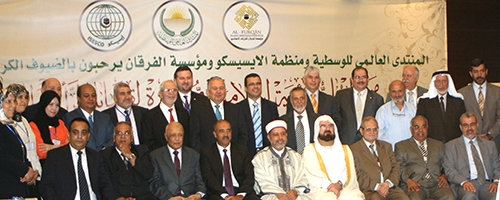
The sessions concluded with reading of the recommendations reached by the participants in the symposium, following two days of work interspersed with detailed discussions and deeply worthwhile suggestions.
It is worth mentioning that the Rabitat Kuttab al-Tajdid of the International Moderation Forum held a function to celebrate the efforts of thinkers and scholars in spreading moderate thought and enlightenment through their publications. During this event, certificates were given out to the participants in the symposium.

